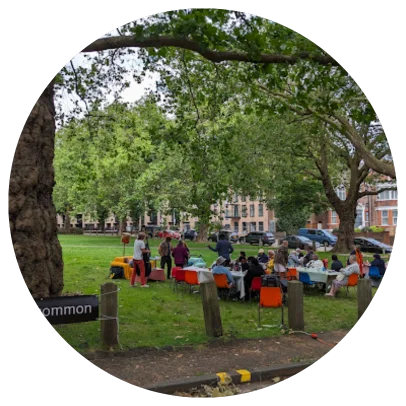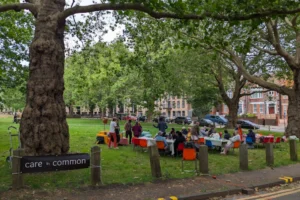Introduction
Led by: Hackney and Southwark in partnership with Equal Care Co-op and Clapton Commons.
Idea in a nutshell: To promote better independent living by piloting a “Care commons” – a strength-based approach underpinned by empowering residents, local community organisations, care workers, care recipients and family carers in Clapton with the skills and knowledge required to recruit care workers, develop care plans and build and resource home care teams through asset-based community development.
Desired outcomes:
- For people receiving care: Better choice about the type of care without higher costs. The “Care commons” approach will allow for a more resilient support network and better connections with community organisations.
- For care workers: As well as better pay and training, also higher job satisfaction – an empowered workforce will have more autonomy in deciding how care is delivered and ensure that care is appropriate and flexible so that it meets the changing needs of the individual.
How we envisage this will work in practice
The project will focus on developing an integrated, localised, home-care service that puts community networks, trained care workers and care recipients at the heart of its delivery. Five operating local care teams will work together with people who need care and their family and friends as well as Clapton Commons to plan and deliver a service that meets the needs of the person being cared for, in their own home. This will allow for a more relational and choice-based type of care driven by those who need care. Technology, more specifically a digital platform, will help connect caregivers and receivers thus, supporting not driving the delivery of person-centred care.
The key output from this process, other than learning more about the effectiveness of this approach, will be a service specification that any borough can use to commission this type of service in the future.
How does it support LOTI’s ambitions for radical new service models?
This is an approach that combines at least three elements of radical new service models as outlined in this article.
- Ownership / organisation type: The co-operative model of Equal Care Co-op allows frontline workers to get fairly remunerated for their hard work without people receiving care paying more. We know that poor job satisfaction/working conditions as well as poor pay are some of the key factors contributing to the high turnover of staff in social care. We hope incentivising the workforce will help create a sustainable and resilient workforce that is motivated to enter and remain in the sector.
- Relationship: The decentralised, bottom-up approach will allow frontline teams to deliver the best combination of formal and informal care with the person needing care at the heart of it.
- Power: This approach flips the power back to local frontline teams, the person needing care and their family and friends who have control over what care should be delivered and in what way. This autonomy and level of personalisation allows for a more flexible and relational type of care in comparison to the usual outsourced service which is often seen as a more standardised form of care. All this contributes to the ultimate goal of a better quality of life.









